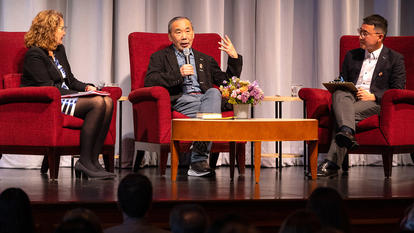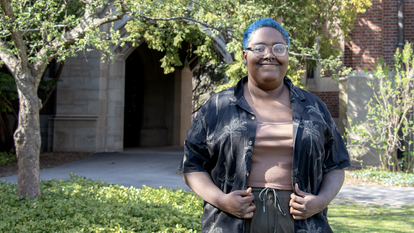What I Did This Summer: Professor Lisa Rodensky, English

After the last spring semester exam has been graded and most students have left campus for summer internships, jobs, and travel opportunities, what do Wellesley professors do? Last Thursday, we began a five-part series that looks at faculty members’ summer breaks as they explore, create, collaborate, conduct research, or travel.
Today, English professor Lisa Rodensky takes us into the world of archives. This summer, she accessed the Wellesley Index to Victorian Periodicals, which originated at the College, and also researched the archival papers of Ian Jackson, an independent scholar who worked on the history of Notes and Queries, a weekly publication that began in 1849.
What were the highlights of your summer?
This summer has been chock-full of archival material. Few people at Wellesley know that the Wellesley Index to Victorian Periodicals—one of the most important bibliographic accomplishments of the 20th century—had its origins here. Its editor was Wellesley English professor Walter Houghton (his wife, Esther Rhoads Houghton, served as an associate editor). The Houghtons, working with a board of editors, took on the monumental task of identifying the authors of articles published in the 19th century’s most influential British periodicals (back in the day, most essays were published anonymously). Houghton left his Wellesley Index papers to our archives, and, with the generous support of archivists Rebecca Goldman and Sara Ludovissy, I had access to those papers in January. Now I am working on a piece that uses the Houghtons’ correspondence and drafts so that I can accurately describe this massive data-gathering effort. The Wellesley Index is so much more than what one might think of as just an index: It created knowledge for other scholars, who can now turn to the Index to find out who wrote what.
My second project has taken me into a different archive, though one that also involves identifying contributors to 19th-century British periodicals. With the support of a Faculty Award, I was able to secure a piece of the archive of Ian Jackson, an independent scholar who, before his death in 2018, did important work on the history of Notes and Queries, a weekly that started in 1849. Jackson’s papers are remarkable, as is the periodical that fascinated him for so many years. Notes and Queries published short bits (“notes”) that were written up by anyone who had discovered something interesting or who had an interesting “query” to pose. It was, as one scholar has described it, an early version of Wikipedia. I am building on the work that Ian Jackson began and writing up my own notes on Notes and Queries.

When you aren’t traveling, what does a typical day look like for you during the summer?
It begins with feline feeding (both my permanent cat, Jolly, and two foster kittens that I am taking care of for a nearby shelter). Then I get back to my projects, reading documents and writing up my findings. Deciphering scholars’ terrible handwriting is a challenge, but that’s part of the great pleasure of using archival documents. In the afternoon, I switch gears and do some reading to prepare for my fall semester class (I am teaching a seminar on Virginia Woolf—just one class this semester because I am chair of the English department). After supper, I look around for something to watch. Right now I’m rewatching movies starring Joan Allen. I’d forgotten how great she is in The Upside of Anger.
What is one thing you want students to know about your work?
I am interested in how people collaborate to produce knowledge. Both the Wellesley Index and Notes and Queries were large-scale collaborative enterprises in the humanities that involved lots of contributors who were not professional scholars. The information in the Wellesley Index reflects the efforts of hundreds of people who were eager (or at least willing) to support the work. The motto of Notes and Queries was “When found, make a note of,” a line from Charles Dickens’ Dombey and Son (1846). What motivated the editors of and contributors to both the Wellesley Index and Notes and Queries was the sharing of knowledge that others could build on.
What’s the most interesting aspect of your summer that you plan to take with you into the next academic year?
I am working on ways to integrate archival research into my courses. So much material has now been digitized and is accessible. One of my favorite sites is Woolf Online, a digital archive that offers readers access to three of Woolf’s notebooks housed in the Berg Collection of the New York Public Library. Although I talk about archival material in class, I have not made those materials central to our enterprise. I’m looking forward to doing so this year. I would also like to create ways for students in the humanities to collaborate on large-scale projects.
Photo: Lisa Rodensky (left) looks through the Houghtons' research cards for the Wellesley Index to Victorian Periodicals with College archivist Rebecca Goldman (right) in the Wellesley College Archives.



